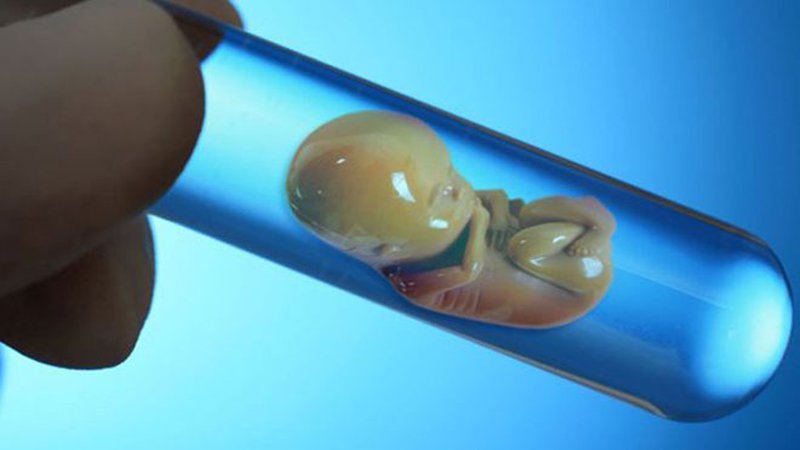Increased fertility in patients with polycystic ovary syndrome
The article is professionally consulted by Master, Resident Doctor Nguyen Thi Tam - Clinician - Reproductive Support Center - Vinmec Times City International Hospital.
Polycystic ovary syndrome is a common endocrine disorder in women. It is also one of the main causes of infertility in women. There are now many treatments that increase the chance of pregnancy in patients with PCOS.
1. What is polycystic ovary syndrome?
Polycystic ovary syndrome (PCOS or Stein-Leventhal syndrome) is a common hormonal disorder in women of reproductive age. Women with polycystic ovary syndrome often have irregular menstrual cycles, may bleed many times a month, or more than 35 days, only bleeding once, sometimes every few months, bleeding may be less. or prolong. Often there is a lot of acne on the face or back, hirsutism on the hands, feet, face or a lot of hair loss, baldness, easy weight gain and difficulty losing weight due to excess androgen. In the long term, when over 40, women with polycystic ovaries may be prone to a number of other diseases such as diabetes, high blood pressure, metabolic syndrome... Women with polycystic ovaries during pregnancy also can have more problems during pregnancy than normal women, affecting both mother and fetus, so pregnancy needs to be monitored more closely. Polycystic Ovarian Infertility? Normally, each month, under the influence of hormones, small follicles in the ovaries will develop, in which 1 follicle grows and ovulates. In women with polycystic ovary syndrome, there is an ovulatory disorder, there is no dominant follicle, leading to anovulatory phenomenon, the woman has menstrual disorders and leads to delayed childbearing and infertility. Can polycystic ovary have children? People with polycystic ovary syndrome still have the ability to get pregnant naturally, but due to ovulatory disorders, menstrual irregularities lead to delayed childbearing and infertility. Ovulation stimulation or IVF increases the chance and shortens the duration of pregnancy in women with PCOS.

Bệnh nhân bị buồng trứng đa nang có thể vô sinh
2. Signs of Polycystic Ovarian Syndrome
Irregular menstruation . Amenorrhea, irregular periods, or amenorrhea are common menstrual disorders in women with polycystic ovary syndrome. Androgen excess: Elevated levels of male hormones can lead to physical signs, such as hirsutism, severe acne, and male pattern baldness. Obesity: Up to 30-50% of women with PCOS are obese. It is due to a disorder in the metabolism that leads to an uneven distribution of fat on the body. Ultrasound image of 2 ovaries with many small cysts (≥ 20 cysts) or an ovarian volume greater than 10ml. Polycystic ovary syndrome is diagnosed when 2/3 of the following criteria are met: + Menstrual disorders – Ovulation disorders
+ Hyperandrogenism: Clinical or laboratory
+ Ultrasound image: Polycystic ovaries
+ Hyperandrogenism: Clinical or laboratory
+ Ultrasound image: Polycystic ovaries

Béo phì là một nguyên nhân gây buồng trứng đa nang
3. Increase the chance of pregnancy in polycystic ovary patients
There are many infertility treatments in polycystic ovary patients such as ovulation induction, ovarian spotting or in vitro fertilization to increase the chances of pregnancy.
3.1. Internally medical treatment
The goal of treatment in patients with PCOS is to stimulate ovulation as close to the physiological state as possible, that is, to induce release of a single ovum to limit complications of ovarian hyperstimulation and multiple pregnancy.
Induce ovulation by losing weight. This method is recommended in obese patients for the purpose of improving spontaneous ovulation. The patient follows a diet with reduced energy (lower fat, increased fiber) and increased physical activity. A 5% reduction in body weight is also of great clinical significance. Metformin: Metformin is used to restore spontaneous ovulation because insulin resistance is thought to play a role in anovulation in patients with PCOS. Insulin resistance and impaired glucose tolerance are common in obese patients. Therefore, metformin is recommended for patients with polycystic ovary syndrome who are obese and have abnormal glucose tolerance test results. Metformin has been shown to improve ovulation, pregnancy, and live birth. It also has the effect of supporting weight loss through the mechanism of increasing insulin sensitivity and reducing hyperandrogenism. Ovulation stimulators: Letrozole aromatase inhibitors are used to induce ovulation in women with polycystic ovary syndrome (PCOS) who are infertile, without other associated factors such as damage or blockage of the fallopian tubes. . The risk of multiple pregnancy with letrozole is less than with clomiphen citrate.
Induce ovulation by losing weight. This method is recommended in obese patients for the purpose of improving spontaneous ovulation. The patient follows a diet with reduced energy (lower fat, increased fiber) and increased physical activity. A 5% reduction in body weight is also of great clinical significance. Metformin: Metformin is used to restore spontaneous ovulation because insulin resistance is thought to play a role in anovulation in patients with PCOS. Insulin resistance and impaired glucose tolerance are common in obese patients. Therefore, metformin is recommended for patients with polycystic ovary syndrome who are obese and have abnormal glucose tolerance test results. Metformin has been shown to improve ovulation, pregnancy, and live birth. It also has the effect of supporting weight loss through the mechanism of increasing insulin sensitivity and reducing hyperandrogenism. Ovulation stimulators: Letrozole aromatase inhibitors are used to induce ovulation in women with polycystic ovary syndrome (PCOS) who are infertile, without other associated factors such as damage or blockage of the fallopian tubes. . The risk of multiple pregnancy with letrozole is less than with clomiphen citrate.

Bệnh nhân buồng trứng đa nang được chỉ định dùng thuốc nhằm kích thích phóng noãn
Use of Gonadotropins: Ovulation with gonadotropins is considered a second-line choice in women with polycystic ovarian syndrome and no other cause of infertility when oral ovulatory therapy has failed. . This method uses a very low initial dose of FSH, then gradually increases to reach a threshold level of FSH just enough to induce monocyte development and spontaneous ovulation. Gonadotropins in combination with metformin can be used in clomiphene citrate-resistant polycystic ovarian patients to improve ovulation, pregnancy, and live birth.
3.2. Surgical treatment
Laparoscopic burning point
Laparoscopic burning of polycystic ovary with the aim is to reduce stromal tissue, reduce androgen, make ovulation easier so that conception can be easier. The advantage of this method is that it has a high rate of inducing ovulation, has a more regular menstrual cycle, and has cyclical ovulation. However, the disadvantage of this method is that if it burns too much, it can cause ovarian failure, causing complications during and after surgery. Therefore, this method is rarely used nowadays.
Laparoscopic burning of polycystic ovary with the aim is to reduce stromal tissue, reduce androgen, make ovulation easier so that conception can be easier. The advantage of this method is that it has a high rate of inducing ovulation, has a more regular menstrual cycle, and has cyclical ovulation. However, the disadvantage of this method is that if it burns too much, it can cause ovarian failure, causing complications during and after surgery. Therefore, this method is rarely used nowadays.

Thụ tinh nhân tạo ( IVF) tăng cơ hội mang thai ở phụ nữ buồng trứng đa nang
In vitro fertilization (IVF)
In the absence of an absolute indication for in vitro fertilization, women infertile due to polycystic ovary syndrome may be offered IVF counseling as the following 3rd line treatment. failure of ovulatory therapy. This method will take eggs and sperm out of the body and conduct artificial insemination in an invitro environment to create embryos, which are nourished and put back into the woman's uterus for development. The advantage of this method is the optimization of insemination. However, in people with polycystic ovary syndrome, performing this method is prone to ovarian hyperstimulation, multiple pregnancies, and high treatment costs. Therefore, patients need to strictly follow the regimen and must be closely monitored.
In the absence of an absolute indication for in vitro fertilization, women infertile due to polycystic ovary syndrome may be offered IVF counseling as the following 3rd line treatment. failure of ovulatory therapy. This method will take eggs and sperm out of the body and conduct artificial insemination in an invitro environment to create embryos, which are nourished and put back into the woman's uterus for development. The advantage of this method is the optimization of insemination. However, in people with polycystic ovary syndrome, performing this method is prone to ovarian hyperstimulation, multiple pregnancies, and high treatment costs. Therefore, patients need to strictly follow the regimen and must be closely monitored.
Oocyte maturation in vitro: Eggs are collected when they are still young, when they have not undergone meiosis, and are raised to mature in vitro. The main advantages of this method are safety due to no ovarian stimulation, convenience, simplicity and reduced cost burden for the patient.
Vinmec Fertility Center is home to a team of leading experts in the field of assisted reproductive technology, trained at fertility centers in many countries such as the US, Singapore, Japan, Australia ... Since its establishment, the Center has treated thousands of infertile couples every year. Vinmec Fertility Center is a pioneer in applying many of the most advanced assisted reproductive techniques today such as hysteroscopy for diagnosis and treatment, diagnosis of mucosal immune disorders. utero, embryo implantation window test (ERAtest), particularly in the treatment of multiple implantation failures with a clinical pregnancy rate of 45%.
With a high level of expertise, professionalism, dedication to patients and extensive experience, Vinmec Fertility Support Center is ready and very happy to realize the dream of becoming a parent of couples in Vietnam. South and around the world.
Master, Resident Doctor Nguyen Thi Tam Psychology graduated as a General Practitioner at Hanoi Medical University in 2015 and graduated with a Master and Resident Doctor of Obstetrics and Gynecology at Hanoi Medical University in 2015. Hanoi. With expertise in reproductive support, Dr. Ly used to work at the National Hospital of Obstetrics and Gynecology. And now, Dr. Ly is working at the Center for Reproductive Support, Vinmec Times City International General Hospital.
Vinmec Fertility Center is home to a team of leading experts in the field of assisted reproductive technology, trained at fertility centers in many countries such as the US, Singapore, Japan, Australia ... Since its establishment, the Center has treated thousands of infertile couples every year. Vinmec Fertility Center is a pioneer in applying many of the most advanced assisted reproductive techniques today such as hysteroscopy for diagnosis and treatment, diagnosis of mucosal immune disorders. utero, embryo implantation window test (ERAtest), particularly in the treatment of multiple implantation failures with a clinical pregnancy rate of 45%.
With a high level of expertise, professionalism, dedication to patients and extensive experience, Vinmec Fertility Support Center is ready and very happy to realize the dream of becoming a parent of couples in Vietnam. South and around the world.
Master, Resident Doctor Nguyen Thi Tam Psychology graduated as a General Practitioner at Hanoi Medical University in 2015 and graduated with a Master and Resident Doctor of Obstetrics and Gynecology at Hanoi Medical University in 2015. Hanoi. With expertise in reproductive support, Dr. Ly used to work at the National Hospital of Obstetrics and Gynecology. And now, Dr. Ly is working at the Center for Reproductive Support, Vinmec Times City International General Hospital.
Để đặt lịch khám tại viện, Quý khách vui lòng bấm số HOTLINE hoặc đặt lịch trực tiếp TẠI ĐÂY. Tải và đặt lịch khám tự động trên ứng dụng MyVinmec để quản lý, theo dõi lịch và đặt hẹn mọi lúc mọi nơi ngay trên ứng dụng.
Bài viết này được viết cho người đọc tại Sài Gòn, Hà Nội, Hồ Chí Minh, Phú Quốc, Nha Trang, Hạ Long, Hải Phòng, Đà Nẵng.






